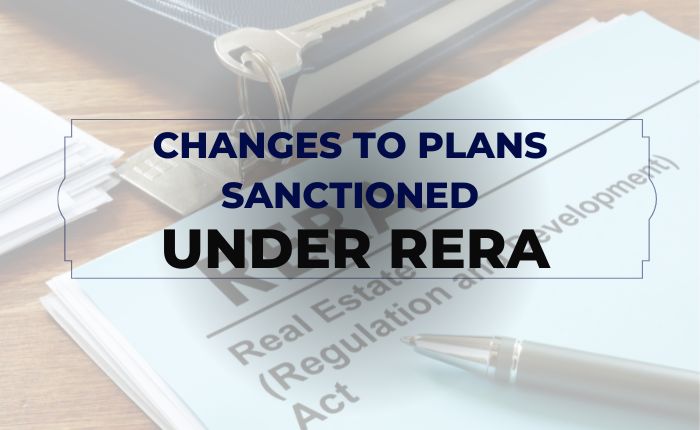The 14th section of the Real Estate (Regulation and Development) Act states that the promoter must follow the approved plans and specifications for the proposed project, as authorized by the competent authorities, throughout the development and completion of the project.
- Section 14 highlights that once the sanctioned plans, layout plans, specifications, and descriptions of fixtures, fittings, amenities, and common areas of the apartment, plot, or building are disclosed to the buyer, the promoter cannot make any changes to the plans or specifications without the prior consent of the buyer.
- However, minor additions or alterations can be made if required by the buyer, or if necessary due to architectural and structural reasons, and these changes must be recommended and verified by an authorized architect or engineer and duly declared and intimated to the buyer. This rule applies irrespective of any law, contract, or agreement to the contrary.
- The Explanation to Section 14(1) clarifies that the term “minor additions or alterations” does not include any structural changes, such as an increase in the area or height of the building, removal of a part of the building, changes to the structure like construction or removal of any wall or partition, column, beam, joist, floor, including mezzanine floor or other support, or changes to or closure of any required means of access ingress or egress, or any modifications to fixtures or equipment.
- According to Section 14, if the promoter needs to make any minor additions or alterations to a specific apartment, plot, or building, they must obtain prior consent from the allottee who has agreed to purchase the property. This rule applies even if the changes are deemed necessary due to architectural or structural reasons.
- The promoter must make a proper declaration and intimate the allottee before proceeding with any changes, and these changes must be duly recommended and verified by an authorized architect or engineer.
- This means that even for minor changes in an individual unit, the promoter must first obtain consent from the allottee. This rule is applicable regardless of any law, contract, or agreement to the contrary.
- Section 14(2)(ii) pertains to modifications or additions to the sanctioned plan, layout plans, or specifications of the building or common areas within a project.
- According to this section, once the plans are disclosed to an allottee who has agreed to take a property, no modifications to the sanctioned plans can be made without the written consent of at least 2/3rd of the allottees, other than the promoter, who have agreed to take apartments in the same building.
- This provision mandates that if the promoter needs to make alterations or additions other than minor changes to an individual unit, in the sanctioned plan, layout plan, and specifications of the building or common areas within the project, they must obtain written consent from at least 2/3rd of the allottees in the project before proceeding with the modifications or additions to the sanctioned plans. This rule applies despite any law, contract, or agreement to the contrary.
- The Real Estate (Regulation and Development) Act defines “sanctioned plan” in Section 2(zq) as a collection of approved plans that includes site plans, service plans, building plans, parking and circulation plans, landscape plans, layout plans, zoning plans, and any other necessary plans.
- This also includes any relevant permissions, such as environmental permission, and other authorizations granted by the competent authority before the start of a real estate project.
- According to Sections 14(2)(ii) and 2(zq), once the promoter has disclosed the sanctioned plan, layout plan, and building specifications to the allottee, any alterations or additions that need to be made to the sanctioned plan – which includes all necessary plans, structural designs, and permissions approved by the competent authority before the start of the real estate project – will require the consent of at least 2/3rd of the allottees.
- The definition of sanctioned plan includes all plans and permissions required for the development of the project, without any exceptions, except for those provided in the explanation to Section 14(1)(i).
- Promoters can no longer rely on the past practice of reserving the right to modify sanctioned plans, regardless of whether the modifications are minor or major, without complying with Section 14 of the RERA Act.
- Even if there is a clause in the agreement or any other document reserving the right to modify unilaterally, Section 14(2) of the RERA Act will supersede such a clause.
If a promoter violates the provisions of Section 14 by making modifications to sanctioned plans without obtaining consent from the allottees as required, the allottee can seek compensation by filing a complaint under Section 31 before the Adjudicating Officer. The allottee can also seek appropriate reliefs, including undoing such modifications, by filing a complaint under Section 35 before the Real Estate Regulatory Authority. Therefore, it is crucial for a promoter to understand that consent of the allottees must be obtained before making any modifications to the sanctioned plans, whether it is for an individual unit or the entire project. This requirement applies even if the project has been registered in phases.
Post Views: 1,856




















